|
|
|
Sort Order |
|
|
|
Items / Page
|
|
|
|
|
|
|
| Srl | Item |
| 1 |
ID:
109956
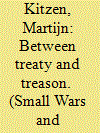

|
|
|
|
|
| Publication |
2012.
|
| Summary/Abstract |
Recent counterinsurgency experiences in Iraq and Afghanistan have demonstrated that the local operating environment often is dominated by indigenous power-holders. As counterinsurgents seek to establish control over the local population, collaboration with these agents has become an essential aspect of contemporary counterinsurgency. Although the practice of constructing collaborative relationships with indigenous power-holders might be perceived as unconventional by today's counterinsurgents, the approach itself goes back to the colonial era in which modern counterinsurgency has its roots. This article explores the dynamics, benefits, and dangers of collaborative relationships with indigenous power-holders by analysing an infamous episode in Dutch colonial history, the case of the collaboration between Dutch colonial authorities and warlord Teuku Uma during the Aceh War (1873-1913). This relationship ended in disaster for the Dutch as Uma departed their side at the moment he had become their pivotal asset in the local political landscape. The article explains that the Dutch succeeded to co-opt Uma, but failed to control him as they lacked the will and means to do so. Furthermore this case study provides an insight in the way the Dutch colonial authorities dealt with the complex process of intelligence-gathering in a fragmented indigenous society.
|
|
|
|
|
|
|
|
|
|
|
|
|
|
|
|
| 2 |
ID:
109955
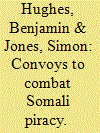

|
|
|
|
|
| Publication |
2012.
|
| Summary/Abstract |
As the world becomes increasingly globalized, interruptions to international trade cannot be permitted. Piracy off the coast of Somalia has hampered international trade in the region and poses significant risks to the sailors required to navigate those waters. Over the past three years the global community has attempted, through a number of different naval tactics, to stop these acts of piracy; however, these tactics have proven ineffective. This article looks at historical precedence and military theory to support the concept of using convoys to protect the thousands of cargo vessels traveling round the Horn of Africa every year. This tactic will greatly decrease the number of successful pirate attacks and save countless lives in the process.
|
|
|
|
|
|
|
|
|
|
|
|
|
|
|
|
| 3 |
ID:
109959
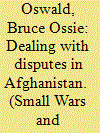

|
|
|
|
|
| Publication |
2012.
|
| Summary/Abstract |
This article addresses the principles that should guide commanders, and the rules they must adhere to, when dealing with community disputes in Afghanistan. An important feature of these principles and rules is that they have been developed to ensure that coalition forces minimize the harm caused to the local population; and that members of the coalition do not violate their own laws and policies. The principles and rules have also been developed to be consistent with counterinsurgency guidance as practiced in Afghanistan. The article concludes with a number of 'Dos and Don'ts' concerning dispute settlement that are relevant for coalition forces dealing with disputes at the tactical level. The article also has two appendices, which are intended to guide commanders to better understand dispute settlement systems in Afghanistan.
|
|
|
|
|
|
|
|
|
|
|
|
|
|
|
|
| 4 |
ID:
109957
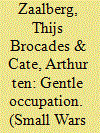

|
|
|
|
|
| Publication |
2012.
|
| Summary/Abstract |
This article examines the so-called 'Dutch approach' to conducting stabilisation operations. The term is mostly used in relation to the mission carried out by the Netherlands armed forces in Afghanistan's Uruzgan province from 2006 to 2010, but actually originates in the Iraqi province of Al Muthanna. Here, a 1350-strong battle group operated from July 2003 until March 2005 as part of the US-led coalition, after which the Dutch forces left Iraq relatively unscathed and self-confident of their ability in dealing with this type of conflict. On the basis of archival research and interviews, the authors unravel the 'Dutch approach' in southern Iraq by tracing its roots and by examining the Dutch operation in the context of the American and British experiences. They argue that despite predominantly effective tactical reflexes and an overall adequately broad interpretation by battle group commanders of a too narrowly defined political mandate, stability in Al Muthanna was conditions-driven rather than the result of a unique and effective approach. The term 'Dutch approach' turned out to be a convenient fabrication which, after the relatively successful mission in Al Muthanna, became increasingly politicised in the run-up to a dangerous new operation in southern Afghanistan.
|
|
|
|
|
|
|
|
|
|
|
|
|
|
|
|
| 5 |
ID:
109952


|
|
|
|
|
| Publication |
2012.
|
| Summary/Abstract |
The new attention paid to 'small wars' does not seem to translate into a better adaptation of conventional armed forces to this type of conflicts. As illustrated by the IDF's inability to get a decisive edge against the Hezbollah during the 33-Day War, Israel is no exception to such difficulty to adapt. A number of analysts have concluded that, victim of its long experience gained through the Intifadas, Israel 'over-adapted' to irregular warfare. Applying a sociological framework inspired by the seminal work of Richard Scott, this study suggests that this view is, at best, arguable. Going beyond the classical military explanations by uncovering key sociopolitical forces that have shaped the Israeli defense institutions, this study proposes that the combination of a post-heroic society and unbalanced civil-military relations have led the Israeli military institution to opt for a conventional posture articulated around technocentric tenets, which are ultimately disregarding the true nature of the asymmetrical challenge presented by the Hezbollah.
|
|
|
|
|
|
|
|
|
|
|
|
|
|
|
|
| 6 |
ID:
109954
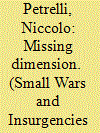

|
|
|
|
|
| Publication |
2012.
|
| Summary/Abstract |
In the course of the 2006 Lebanon War the Israel Defense Forces (IDF) employed special operations forces (SOF) for raids against Hizb'allah's command and control structure. This article argues that a faulty conceptualization of the value of special operations and misguided expectations determined by the new IDF concept of operations impacted adversely on the employment of SOF for this kind of operations. Both these elements contributed in turn to substantially degrade SOF performance in the context of the war.
|
|
|
|
|
|
|
|
|
|
|
|
|
|
|
|
| 7 |
ID:
109958
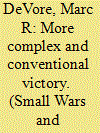

|
|
|
|
|
| Publication |
2012.
|
| Summary/Abstract |
Following the emergence of a communist regime in South Yemen and the multiplication of subversive movements in the United Kingdom's Gulf protectorates, British policymakers genuinely feared the spread of communism throughout southern Arabia. Defeating the People's Front for the Liberation for the Occupied Arabian Gulf (PFLOAG) insurgency in Oman's Dhofar province was considered central to preventing such an outcome. In their pursuit of victory, British officers overthrew the sultan of Oman, escalated the war by conducting attacks in South Yemen, and, ultimately, appealed to Islam as a means of rallying support against communism. However, lessons learned in previous counterinsurgencies (Malaya, Kenya, and Borneo) proved of only limited value in Oman's physical and cultural environment. Unfortunately, none of these measures worked as anticipated. Only Iran's direct military intervention and the dramatic growth of Oman's financial resources after the 1973 oil crisis provided the resources to conduct large-scale offensive operations. Even so, victory was only achieved in 1975 because the rebellion's leaders unwisely attempted to oppose the Anglo-Omani offensives conventionally.
|
|
|
|
|
|
|
|
|
|
|
|
|
|
|
|
| 8 |
ID:
109951
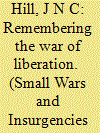

|
|
|
|
|
| Publication |
2012.
|
| Summary/Abstract |
The aim of this article is to consider how Algeria's most prized achievement and treasured memory - the FLN's victory over the French in the war of liberation - has helped stimulate and sustain the violence that has blighted the country since independence. It argues that successive governments have propagated a legend of the war that encourages and legitimises rebellion and armed resistance. By celebrating the actions and achievements of a committed band of revolutionaries they have established a precedent whereby it is every citizen's duty to oppose and resist an unjust government. Time and again therefore, insurgent groups like the FFS, MIA, and AIS have justified their actions and won popular support by portraying themselves as the early FLN's natural heir.
|
|
|
|
|
|
|
|
|
|
|
|
|
|
|
|
|
|
|
|
|